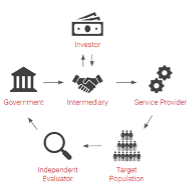In a first-of-its-kind collaboration, the Office of the Vice President for Research (VPR) and the Sorenson Impact Center (SIC) housed at the David S. Eccles School of Business, are proud to announce the launch of the Innovative Finance for Translational Research program.
Utilizing innovative finance and outcomes-based financial models, this program seeks to connect evidence-based, social and environmental interventions with public and private funding to implement and scale those interventions within the community.
“We are excited to partner with the VPR Office to embark on this collaboration between a research university and an impact finance center,” said SIC managing director of impact finance Janis Dubno. “The Sorenson Impact Center prioritizes finding innovative ways to connect capital to social and environmental solutions, with a particular focus on equity and inclusion. This program will amplify the impact of university-driven research to improve outcomes for underserved communities and promote environmental sustainability.”
Dr. Erin Rothwell, Interim Vice President for Research, said, “This program could be a gamechanger for funding future research breakthroughs. In the past, there’s been this perception that research remains within the research or academic institution, and then the community or the state doesn’t benefit from all these great advancements. The University of Utah is one of the first institutions to look at outcomes-based funding in a systematic way. The VPR Office and the Sorenson Impact Center are creating a program where we will implement potential research interventions on a statewide basis.”
How does the Innovative Finance for Translational Research program work?
Outcomes-based financing is an innovative financing mechanism that changes the way government and other funders of social and environmental programs and strategies pay for those programs. Rather than the government funding an intervention upfront, private funders provide the up-front working capital to implement a program, outcomes (or success) metrics that are measurable are agreed upon and established in a contract. 
An independent evaluator determines if the outcome metrics have been achieved during implementation, and if so, the government will pay back the private funders with a modest return on investment. Payments are only made if outcomes are achieved. In this way, the risk of performance or success is transferred from government to the private funders.
Under the Innovative Finance for Translational Research program, projects and interventions that are evidence-based, or promising are excellent potential candidates for community translation through this innovative financing approach. Previous outcomes-based financing programs in the United States and internationally have focused on a variety of sectors such as homelessness, workforce development, early childhood, health, maternal and child health, wildfire prevention and water conservation.
Qualifications and funding for the Innovative Finance for Translational Research program
Funding availability for each project will depend on the cost of implementation, the size of the need and target population, and the preferences of funders interested in the intervention or project. While funding is not guaranteed, most outcomes-based financing projects receive between $5-$30 million in funding.
The University of Utah and the Sorenson Impact Center, or any of its affiliates, are not investors or capital holders and will not be directly contributing funds to any intervention.
A request for faculty proposals will open on January 9th, 2023. Promising proposals will enter the pre-feasibility scan period which lasts between February-August/September 2023, after which selected candidates will move on to the full feasibility assessment phase starting in October 2023.
For more information on the timeline for candidate selection and a list of criteria sought after in potential candidates, please see the FAQ section on the program’s website.
For more information or questions about the Innovative Finance for Translational Research program, please contact SIC associate Gabe Freeman.
